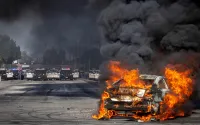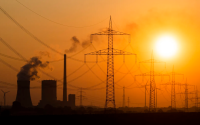Znet November 04, 2002
Graham Greene once described a "subterranean world, where the hopes and dreams of the mass of the people reside, unconnected with the rarefied world above, until those above take one step too far". There is a stirring in this people's world as those above take many steps too far.
In the United States, according to the Institute for Policy Studies, there were at least 400 major demonstrations against an attack on Iraq up to mid-October. "There is a rising tide of activism," reported the Washington Post, "a burgeoning national anti-war movement that is gaining momentum by the day . . . They talk of protesting by people who have never protested before."
The acknowledgement was unusual. One measure of the strength of popular anti-establishment movements is their suppression as news. Millions of people took to the streets in Italy last month, yet the main political news in Britain the next day was the latest Machiavellian utterances of Gordon Brown. On 28 September, the historic demonstration of 400,000 people in London was considered worthy only of trivialisation by the Observer. Nowhere in the begrudging reporting of that extraordinary day was there recognition of a new, diverse and growing constituency of angry people no longer interested in the small circuses that fill tombstones of column inches, such as the diddum tears of Estelle Morris.
My guess is that a great many people would agree, for very different reasons, with Peter Mandelson's prediction that "the era of representative democracy is coming to an end". That has long been demonstrably true in the United States. It is a truth that has eluded many journalists and broadcasters, understandably, as the main function of so much political reporting is to run a cigarette paper between the parties and to channel spin.
The public understands this, which is why the audience for political news on television has slumped. Blaming the public for its "lack of interest in politics" is the self-deluding excuse of media executives who claim an insight into the popular mood, yet are contemptuous of it. In truth, the public has never been more interested in real politics, which it does not
associate with the deceptions and gossip of an elective oligarchy.
Certainly, Tony Blair's obsession with Iraq has provided the fastest-emerging public arena. But it runs deeper than that. Public anger at the demise of true democracy has long been misjudged by the media as apathy, in the same way that the public's "compassion fatigue" was invented to cover the failure of broadcasters to report the lives and struggles of the majority of humanity. That Blair is prepared to tear up the United Nations' Charter and attack a country that offers Britain no threat, transparently so that America and Britain can get their hands on Iraqi oil, is perceived as an offence to basic decency and to democracy itself.
People understand, I believe, that a government which has no popular mandate for major policies covering war, health, education, privatisation and transport is not democratic. A prime minister who is prepared to use the royal prerogative, "the divine right of kings", to attack another country illegally against the wishes of the majority of his people, is clearly not a democratic leader.
The last British general election was misrepresented as a "landslide" when, in reality, it was the lowest vote since universal suffrage began. People were not indifferent. They were angry or dismissive, and they went on strike on election day. Under Blair, a process spanning two decades, from the creation of the Social Democratic Party in 1981 and Labour's "policy review" six years later which embraced Thatcherism, has reached its conclusion. The two main Westminster parties have effectively converged. Britain is now a single-ideology state with two principal competing factions. Both agree on all major domestic and foreign policy.
For the first few years of Blair, those who clung to Labour struggled with the nonsense of a "modernising third way" whose promoters, such as Anthony Giddens, disingenuously persisted in calling it social democracy. Mavericks elsewhere in the political spectrum were on to Blair. "There is nothing anomalous about Blair's cultivating Formula One racing millionaires, gangster-style newspaper proprietors and spiv businessmen," wrote A N Wilson. " . . . he puts the Murdochs into positions of absolute power and brings into being a sub-American world, in which everything is wrecked - the past, the natural world, our sense of decency."
One shame-faced MP recalls, "Remember the media triumph of single-mother benefit cuts? On the night that Blair's babes waltz through the lobbies taking £7.50 out of the purses of single mothers, we have Blair drinking champagne with that arsehole Chris Evans in Downing Street! How do you think that plays back in the constituencies?"
Three weeks ago, four eminent geographers explained to the Policy Studies Association how the Blair government lied - manipulating and omitting statistics on just about everything: education, health, the economy. Does anyone believe Blair over Iraq? Lying about its war aims has been a feature of the government, whose adventures have been dressed up as "humanitarian intervention" by Blair's courtiers, hoping to preserve the taboo that makes the link with British imperialism. Not only are there the oil interests, but Britain is second only to the United States as an owner of overseas investments. This is a government of death. Britain under Blair exports chemical weapons to 26 countries - so much for the hysteria about Saddam Hussein.
The two most important roles played by the Blair government are preventing any concerted opposition in the European Union to Bush's war plans and lending respectability to the Americans' ruthlessness. As the figleaf in an American "coalition", the government has spent a billion pounds bombing Iraq; a criminal act by any reading of the relevant conventions. "To be corrupted by totalitarianism," warned George Orwell, "one does not have to live in a totalitarian country." There is a growing understanding of this among British people. Every day now there are packed political meetings somewhere in Britain: from the thousand or more at one recent event in Birmingham, to an overflowing hall in Salcombe, Devon. Where I live, in south London, there is something major every evening. The energy and organisation are far advanced on the 1960s, rather like the political awareness of people themselves, especially the young.
For all the achievements of the movement against the Vietnam war, it did not get under way until four years after the Americans had invaded. Today, under countless banners, from the anti-globalisation movement to the Stop the War campaign, the new movement, drawing millions all over the world, may well be the greatest. We need it urgently.






